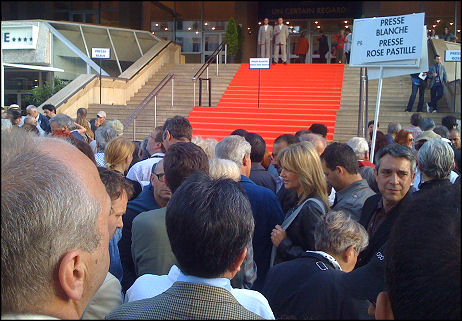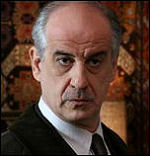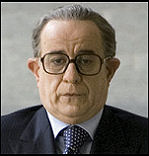
Prior to Thursday evening’s Il Divo screening at the Salle Debussy — Thursday, 5.22, 7:15 pm. (The third in a series of Debussy steps photos.)

Taken at Friday’s Sony Pictures Classics/Adoration luncheon at the Carlton Beach — 5.23, 2:10 pm.


After 10 or 11 straight days of whirlwind, 6:30 am-to-midnight Cannes Film Festival hammering, I had my first taste of relative calm and quiet today. The end of every big-time film festival demands at least a day of chill-down or else. All to explain that while I posted some stuff today, I couldn’t bring myself to write about Charlie Kaufman‘s Synecdoche, New York. Tomorrow maybe.


“Never overdramatize things. Everything can be fixed. Keep a certain detachment from everything. The important things in life are very few.” — former Italian Prime Minister Giulio Andreotti, whose political career, particularly the events that led to revelations about his ties to the Italian mafia and reported complicity in the murder of a journalist, is dramatized in Paolo Sorrentino‘s Il Divo.



Wisdom, or a semblance of same, sometimes comes from very odd places. There’s nothing very admirable about the Andreotti portrayed in Il Divo — an uptight, coldly calculating Machievellian politician of the highest (or lowest, as the case may be) order. But since hearing the above lines during Thursday night’s screening, I haven’t been able to shake them. It’s almost become a kind of mantra to me. A way of fending off life’s unruliness that I’ve considered and agreed with in discussions from time to time, but hearing the above spoken by actor Toni Servillo (whose performance as Andreotti is somewhere between a marvel and a hoot) led to some kind of “aha!” moment.
Since Thursday night I have become, as far as this approach to life is concerned, an Andreotti convert of sorts. As far as dealing with life’s hassles is concerned. Be cool, don’t get all cranked up, there’s always a way through it. Call me Darth Implacable.
I seem to recall Oliver Stone saying something to the effect that the experience of making Nixon led him to admire or at least appreciate some of the virtues of Richard Nixon. The big-time politicians with the darkest souls have frequently passed along some very choice pearls, it seems. The wit and wisdom of Ferdinand Marcos, Josef Stalin, Pol Pot, etc.
Il Divo hasn’t a prayer of betting distributed in the States. As Variety‘s Jay Weissberg noted in his 5.23 review, the film’s “sole drawback is that non-locals will feel inundated by names, most of which are familiar only to Italo auds…this is a brave, bold film whose chances of international success are relatively small, but whose ramifications are huge.”
He called Il Divo “a masterpiece for Sorrentino…an intensely political film so wildly inventive and witty that it will become a touchstone for years to come. Pic features an astonishing degree of craftsmanship and a towering performance by Servillo.”
I knew I was seeing something intensely audacious and stylistically exciting, but the political arena it depicts is so dry and complex and wholly-unto-itself that gradually the film makes you feel as if you’re lying in an isolation tank. Most of the journos I spoke to after the screening expressed admiration for it, but at the same time confessed they weren’t all that drawn in, a result of the syndrome Weissberg described.
The Village Voice‘s Jim Hoberman has called Steven Soderbergh‘s Che a “single-minded meditation on the practice of guerrilla warfare, the creation of militant superstardom, and the nature of objective camera work[that] is at once visceral and intellectual, sumptuous and painful, boldly simplified and massively detailed.
“Despite this, as well as a commendable performance by Benicio Del Toro, Che may require its own miracle — or at least a few angels — to reach an audience in the form Soderbergh intended. While the first half could certainly be tightened, the movie demands to take its time and be taken in at a single sitting. One can only hope that the world beyond Cannes will get the opportunity to do so at something approaching the original running time.”
One thing discussed yesterday about Che‘s chance of winning the Palme d’Or (but which I didn’t mention in my same-day riff about same) is that everyone on the jury knows that Che, in part because certain humbuggers are saying it’s not releasable in the U.S. in its current form, really needs the Palme d’Or to give it a psychological leg up. Which is why I suspect they’ll act accordingly.
The Daily Mail‘s Liz Jones, in a piece called “Cannes of Worms,” ask a producer friend “whether a party is quite the right place, being so noisy, to pitch an idea to a mega-rich investor. He looks at me as if I’m mad. ‘We don’t pitch at the parties. We get them to trust us.’ And how do you do that? ‘We take drugs together,’ he says.
And when you do finally get to pitch, what…well, floats their yacht? ‘If you want your movie to get made,’ the producer replies, ‘you have to pitch an idea that is either about the environment or about pornography. Basically, you have to make an investor feel either guilty or horny.'”

Those with a semblance of smarts and education rarely have trouble getting a thought out. What they — all of us — do have trouble with from time to time are the words in passing — obiter dicta — that convey dark, underlying notions that we don’t mean to “say” but which seep through regardless. Truth-outs.
Whip-smart Hillary Clinton could have said, “My husband did not wrap up the nomination in 1992 until he won the California primary somewhere in the middle of June, right? And we all remember that the race between Bobby Kennedy and Eugene McCarthy went on until June of ’68, and that the race between Kennedy and Hubert Humphrey would have certainly continued until the August convention in Chicago.”

But no — she said that Bobby Kennedy was assassinated in June of that summer, and I think we all sorta kinda know what she was getting at…right? She was saying that the odds are less likely that she’ll be shot if she gets the nomination.
She’s tried every other possible rationale under the sun. We all know she implies exactly what she means to imply every damn time she opens her mouth (Barack Obama is not a Muslim “as far as I know,” etc.) Is this not how she’s been playing it all along? And now, apologies aside, she’s introduced the bullet factor into the final days of the campaign. Classy.
Here‘s N.Y. Daily News columnist Michael Goodwin on the matter.
Newsweek‘s Jonathan Alter on her general rationale for staying around, hoping for some kind of cataclysmic upset. Here’s another analysis, excerpted from Keith Olbermann‘s Countdown — “meltdown,” “something sad about it,” “things going down the drain,” etc.
Fantasy Moguls’ Steve Mason is reporting a 23% surge in yesterday’s receipts for Indiana Jones and the Kingdom of Crystal Skull, resulting in $30.8 million and a projected three-day tally of $100 million, and a projected five-day count that will be “close to” $150 million. Second biggest Memorial Day weekend haul in history, he says.
Total MK, a passionate but (in this instance) angry fan, slams Indiana Jones and the Kingdom of the Crystal Skull. Not my take (I felt it was good enough, had its moments), but the guy is funny and, as far as it goes, more often than not spot-on.



To my great surprise and delight, Christy Hall‘s Daddio, which I was remiss in not seeing during last year’s Telluride...
More »
7:45 pm: Okay, the initial light-hearted section (repartee, wedding, hospital, afterlife Joey Pants, healthy diet) was enjoyable, but Jesus, when...
More »
It took me a full month to see Wes Ball and Josh Friedman‘s Kingdom of the Planet of the Apes...
More »

Unless Part Two of Kevin Costner‘s Horizon (Warner Bros., 8.16) somehow improves upon the sluggish initial installment and delivers something...
More »
For me, A Dangerous Method (2011) is David Cronenberg‘s tastiest and wickedest film — intense, sexually upfront and occasionally arousing...
More »
Posted on 11.27.23: “One thing that’s always bothered me about Virginia Wolff is that George and Martha’s young guests —...
More »